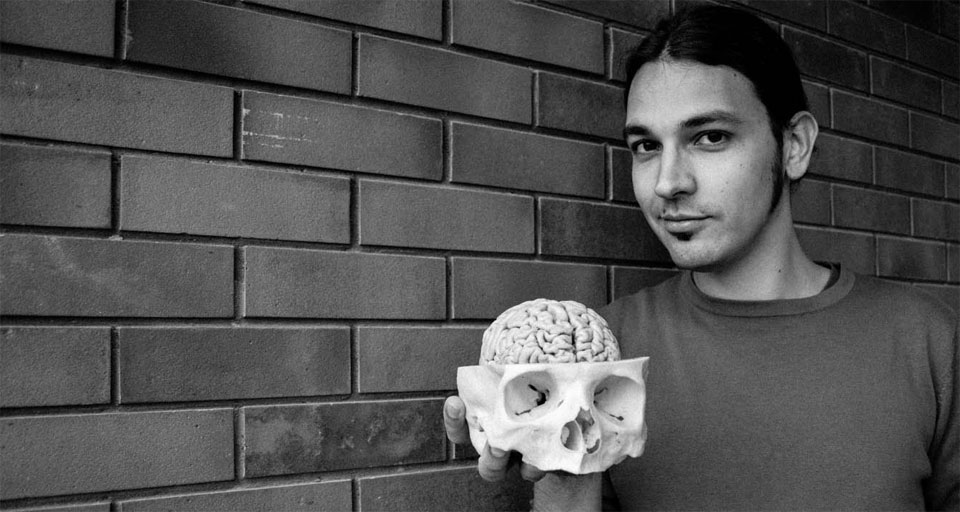Joining forces against ALS
03-03-2017
ALS is a complex neurodegenerative disease with considerable consequences for the patient. Whilst the cause of the disease remains largely unelucidated to this day, we also know very little about those highly motivated researchers dedicated to investigate the origins of the disease, without ‘pomp and circumstance’. Who are the torchbearers in the darkness of ALS?
Joining forces against ALS
By Aldijana Cosic

Photo: Courtesy of Steven Boeynaems
One of them is Steven Boeynaems, a molecular biologist at VIB and KU Leuven focusing on neurodegeneration in ALS and related disorders. ALS Liga Belgium has recognized his talent at the early stage of his scientific career, and has supported Boeynaems’ research since. This support has further strengthened his dedication and has increased his efforts to reveal the mechanisms responsible for ALS. He will soon be leaving to Stanford University, to pursue his research there. Despite many things that need to be done before the departure, he found time for an interview. We talked about ALS Liga, grants, projects, his search for new insights and better therapeutic strategies for ALS, approached, as he says, from a different angle.
In what respect is your approach different?
I studied bioengineering, rather than neurology or biomedical sciences. Although my studies were not disease or medicine centred, the faculty made sure we had a very strong background in cell biology and genetics in combination with the traditional ‘hardcore’ sciences. This deep knowledge of the workings of a cell, combined with chemistry, physics and the problem solving so typical for engineering, definitely has benefited me in my research. ALS is a very complex disease, and we still don’t know how to fit together all the pieces of the puzzle. I try to approach this ‘riddle’ from a more fundamental perspective and aim at further uncovering the processes that are perturbed at the molecular level at the onset of the disease.
Is there a particular reason why you chose ALS as your research topic?
During my MSc thesis I was studying the role of DNA repetitions in evolution. It was exciting science, and I loved it. I was really intrigued by these DNA repetitions. (Un)fortunately, I wasn’t able to secure a PhD grant for this fundamental research. So I had to switch labs.
I was convinced I wanted to keep on studying these DNA repetitions. Then I suddenly read a paper describing the discovery of DNA repetitions as a cause of ALS, namely the C9orf72 gene mutation. I found out there was even a lab here in Leuven focussing on ALS. So I immediately send Prof. Robberecht an email telling him I was super excited about the research and that I wanted to work on the C9orf72 mutation. I convinced him to hire me, and was lucky enough to get eventually (after multiple applications) a PhD grant.
Honestly, I did know very little about ALS at the start. Yet, I was immediately intrigued by this complex disease and jumped straight into the project. Working with DNA repetitions can be very challenging technically, so my previous experience was crucial in starting this project.
That was over 4 years ago, now the picture has changed. When I first visited the ALS Liga, I was so inspired by all the hard work of the volunteers, and the gripping and heart-breaking stories of the patients. That day, ALS became personal to me, it wasn’t just a disease anymore. It became the reason to put more time, more dedication, and more effort into my work, to push myself and my research further. In retrospect, not getting that first PhD grant was maybe one of the best things that ever happened to me.
You’ll soon be leaving for the USA, what is the occasion?
If you are passionate about research, the USA always has something magical. There are a lot of top universities and institutes there, and generally the funding climate is somewhat better. “Money is not an issue, only time is” is a motto you frequently hear there. So at least in research the USA still remains the land of opportunities.
I’m going to pursue a postdoc at the lab of Prof. Gitler at Stanford University. We previously worked together and discovered using both yeast and fly ALS models a novel mechanism in C9orf72 ALS. This was a breakthrough in our understanding of how the C9orf72 mutation causes the disease. We thought that it would be good to pursue this collaboration further, and dig deeper into the causes of ALS. We both are really interested in figuring out the initial steps of the disease. For now this is largely a black box, yet by understanding these processes we will be able to come up with new therapeutic targets in the future.
I am truly thrilled and honoured that I get the chance to work at one of the best universities in the world, and to collaborate with so many great scientists there. I have visited the campus before, and the sheer number of top labs there is very humbling thought. I am eager to learn as much as possible during my stay there and hope to push my research to a higher level. As a kid I always dreamt of becoming a scientist one day. This is for me the logical next step in pursuing that dream.
What do you expect to be different at Stanford compared to your research in Leuven?
KU Leuven is a very good university with top scientists. All I know I have learned here, and so I am very grateful for all the mentors I’ve had, who pretty much taught me everything. Research is problem solving. You need to be creative to come up with new ideas and approaches to test them. Hence, the constant movement of ideas is crucial to research: Getting new perspectives, learning new techniques, exchanging ideas. So for me it would be wise to broaden my horizon anyways.
Stanford arguably has an even greater concentration of top scientists. Being able to collaborate and exchange ideas there will definitely make me a better researcher. It is just such an inspiring and exciting environment that promotes innovation. California has many world-renowned ALS labs, and most of them collaborate closely. This only creates more critical mass to push through new developments and pursue big projects. As mentioned before, there still tends to be more money available for research in the USA. Since biomedical research is so costly, this of course is undeniably an advantage. If an experiment needs to be done, you don’t need to worry that there won’t be the money to do it.
Obviously scientific research has a great appeal to you. On the other hand scientists also encounter difficulties and obstacles. Could you give a couple of examples describing things that were challenging and difficult for you in executing your work?
I am 100% honest if I say that I have made my hobby my job. Since I was a kid I dreamt of one day becoming a scientist. I love being in the lab and making discoveries. This is what I wish to do for the rest of my life.
But of course there are days that even I have to drag myself to the lab. People often think that science is a person in a lab coat yelling “Eureka” every day. On the contrary, science is 95% failure. Experiments fail because of technical reasons, hypotheses can be wrong, results don’t replicate... It is a frustrating profession, and dealing with failure is probably the hardest thing of being a scientist. But the days that an experiment works or you finish a paper, can be very euphoric and make up for all the bad luck and failure you had to endure to get there!
Besides doing science, there are however several other (frustrating) jobs a scientist has to face. Experiments, especially with animals, involve a lot of paperwork and administration. But probably the most frustrating part is writing grant applications. The writing itself is not too bad, but when you know that the success rate of grants is sometimes as low as 15%, that full week of writing all of the sudden seems meaningless and a waste of time. Yet we still need to continuously search for new money to be able to keep our research going.
Most people envision scientific research as an adventurous, exciting enterprise. But scientists often struggle to combine their work (long hours, deadlines) with their personal life. How do you deal with this?
It is very exciting and adventurous! The feeling you get, when you finally figure out how something works after weeks of experiments and trying to prove your hypothesis, is very rewarding. Yet this seems to come indeed at a cost. For example, for me 70-80 hour work weeks are no exception, and some periods rather the rule. When pushing for a deadline I have found myself sleeping in the lab. My friends who went to industry tell me I am crazy. ‘Working over-time without any compensation?’ Yet, I get to do every single day what I love most, which is priceless.
Combining the long hours with your personal life can indeed be challenging at times. I praise myself lucky that I have friends and family that support me in what I do. There is also a very good cohesion between the PhD students in our lab. Whenever someone has a setback, the colleagues are always there to motivate you and get you back on track.
Is there a lot of competition in your research field with regard to funding research projects?
Every year it gets more and more difficult to obtain funding. The money allocated to science doesn’t drastically increase, yet the number of students does. So getting a PhD grant nowadays is, besides having a good project, pretty much dependent on sheer luck. I myself had to apply four times before I was able to secure a PhD grant. Grants indeed last generally only two to four years. So the lab has to continuously apply for new grants to prevent that we run out of money.
Overall there is a decent funding climate in Belgium. Yet, because of discrepancy between the rise in scientist versus the rise in budget, it becomes harder and harder to get money. Even in times of budget cuts, the government should not forget that we are evolving more and more to a knowledge-economy. The scientific research we do now will generate revenue and jobs in 10 years. The Vlaams Instituut voor Biotechnologie (VIB) is a good example of how scientists convinced policy makers to make this ‘leap-of-faith’. The Flemish biotech industry is booming, and the efforts made by VIB 10 years ago laid down the foundation for this success.
You had a successful grant application together with ALS Liga. How important is your cooperation with ALS Liga, and what has their support mean to you?
My postdoc Elke Bogaert and I received a grant to further our studies using the fruit fly as a model. The money we got from the ALS Liga directly contributed to two published studies, and another one is on its way. Since we were starting up the project back then, the money was very welcome. We hadn’t secure any bigger governmental grants for this project, so with the money from the ALS Liga we didn’t have to wait and could jump in immediately.
But this wasn’t for us just about the money. Countless volunteers spilled blood, sweat and tears to get this money, and then they gave it to us! This gave us a great sense of responsibility. We had to do our very best to make most of this money, and to let it contribute as best as possible to our understanding of ALS. Looking at all what we achieved over the last few years, I honestly think we spend it in the best ways we could.
ALS is a very hard and complex disease, but also fairly unknown for the general public. For researchers, there are still many challenges ahead to investigate mechanisms responsible for its onset. What would be in your view a good way to inform more people about ALS and to involve them more?
Like I already mentioned, before I jumped into the ALS field I knew little more than that Stephen Hawking had the disease. But things are slowly changing. The hard work of so many volunteers at the ALS Liga has definitely put the disease into the spotlight. We also try to do our share. Several people in our lab go around Flanders to give science workshops for kids. Personally I have given this workshop already to more than 300 kids. I also gave a TEDx talk and wrote an article for Psyche&Brein on ALS. Wherever we can try to raise awareness for ALS. I am confident that all these efforts will help us fighting this disease together.
The best example of this, in my opinion, is Project MinE. No-one thought it was possible, but when enough people come together, when patients and scientists join forces, everything is possible.
|
Project MinE is an international research initiative, aiming at large-scale DNA analysis to contribute to understanding the genetic basis of ALS. |


